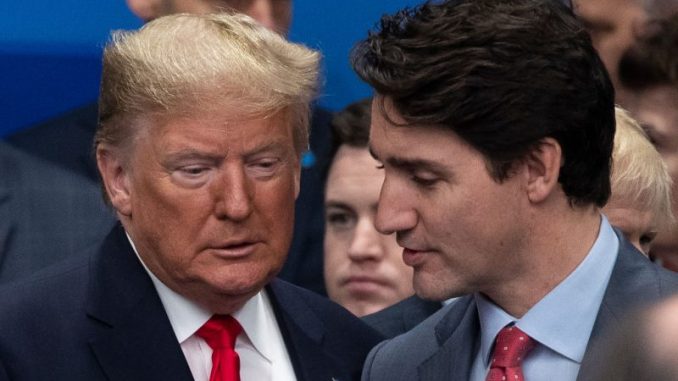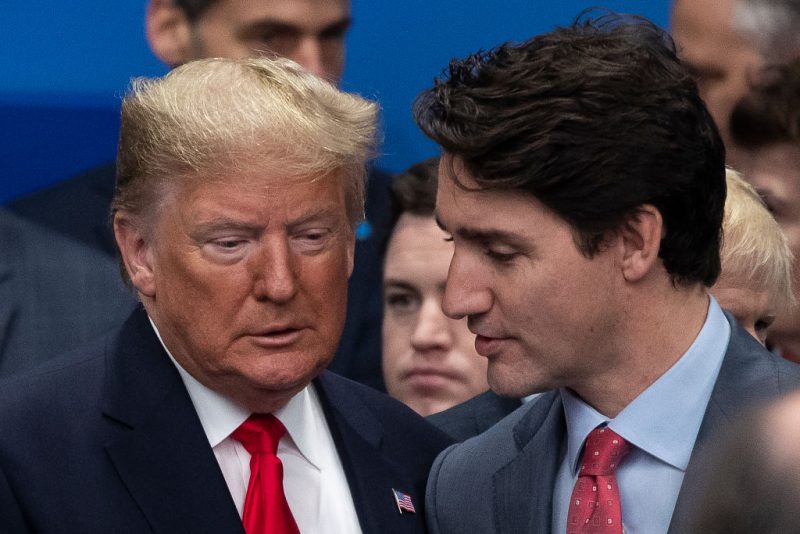

OAN Staff James Meyers
8:35 AM – Tuesday, February 4, 2025
President Donald Trump and Canadian Prime Minister Justin Trudeau have announced a temporary deal to halt the imposition of 25% tariffs on each other’s imports for 30 days while a final border security pact gets hashed out.
Advertisement
Trump and Trudeau spoke on the phone twice Monday before announcing the agreement, with the neighboring country set to ensure 10,000 troops will be stationed at the northern border and the Prime Minister bowing to take steps to crack down on fentanyl smuggling.
“Canada has agreed to ensure we have a secure Northern Border, and to finally end the deadly scourge of drugs like Fentanyl that have been pouring into our Country,” Trump announced on Truth Social, following the call with Trudeau. “Canada will implement their $1.3 Billion Border plan.”
“As President, it is my responsibility to ensure the safety of ALL Americans, and I am doing just that,” he added. “I am very pleased with this initial outcome.”
In a separate post on X, Trudeau indicated that Canada would move ahead with its $1.3 billion border plan announced in December, weeks after Trump first threatened the 25% tariffs that were set to take effect at 12:01 a.m. Tuesday.
The initiative, Trudeau said, includes “reinforcing the border with new choppers, technology and personnel, enhanced coordination with our American partners, and increased resources to stop the flow of fentanyl. Nearly 10,000 frontline personnel are and will be working on protecting the border.”
“In addition, Canada is making new commitments to appoint a Fentanyl Czar, we will list cartels as terrorists, ensure 24/7 eyes on the border, launch a Canada- U.S. [sic] Joint Strike Force to combat organized crime, fentanyl and money laundering. I have also signed a new intelligence directive on organized crime and fentanyl and we will be backing it with $200 million.”
The latest move comes after earlier Monday, Trump and Mexico President Claudia Sheinbaum announced a similar month-long pause on the looming 25% tariff against America’s southern neighbor.
Mexico announced they would be dispatching 10,000 Mexican National Guardsmen to the U.S. border and claimed that the Trump administration would help in cracking down on illegal weapons being trafficked into its territory.
Just after Trump won the presidential election, he threatened to hit Canada and Mexico with tariffs if they didn’t listen to his demands of cracking down on fentanyl trafficking as well as illegal immigration.
After the threats, Trudeau immediately flew down to Mar-a-Lago to meet with the then-incoming president to discuss the issues.
In January, Trudeau announced that he would be stepping down as leader of Canada’s Liberal Party after a successor gets chosen in March. Canada is set to have elections in October.
Meanwhile, the 25% tariff would make a serious impact against Canada, given that almost 75% of its exports go to the U.S., while roughly 13% of American exports go to Canada.
According to the U.S. Census Bureau, last year the U.S. imported some $377 billion worth of goods from Canada while exporting $322 billion.
Overall, the U.S. takes in almost $1.4 trillion annually of its imports from Canada, China and Mexico, its three biggest trading partners.
In the near future, the Tax Foundation projects that if all three tariffs went into effect, the average U.S. household would see a tax hike of about $830.
Stay informed! Receive breaking news blasts directly to your inbox for free. Subscribe here. https://www.oann.com/alerts
Advertisements below

